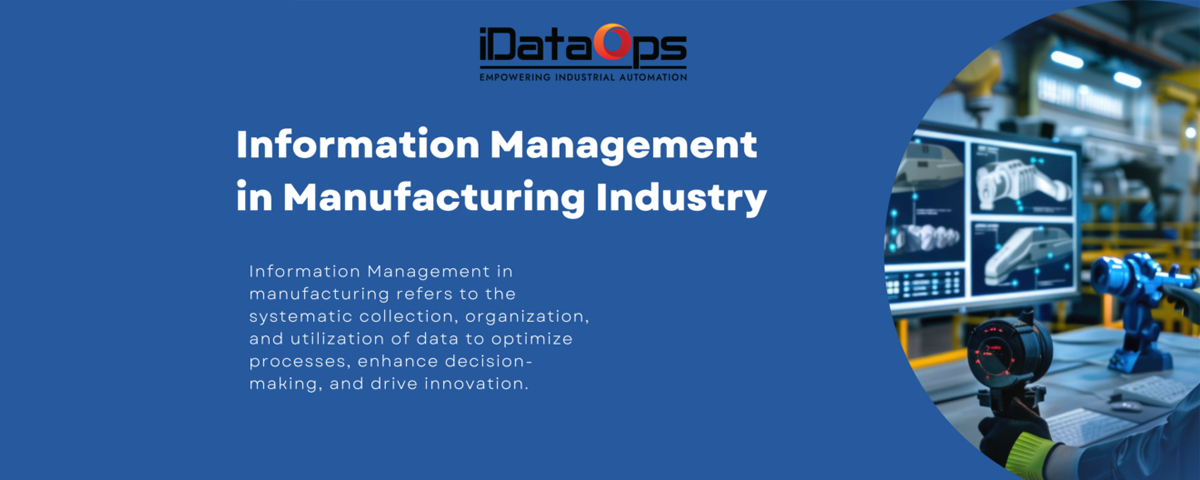
American Manufacturing Summit
June 3, 2024
Real-Time Data: Empowering Smart Manufacturing with iDataOps
September 11, 2024How Information Management is Revolutionizing the Manufacturing Industry in 2024?
Imagine stepping into a bustling factory from the early 1900s. The constant hum of production lines and the clatter of machines set the pace of progress. Fast forward to today, and while the manufacturing floor looks markedly different, the spirit of innovation remains strong. Central to this transformation is Information Management (IM)—a game-changing force that is redefining how manufacturers operate.
In 2024, the narrative of production is being redefined yet again, this time by the onset of the digital revolution. Picture a scenario where information moves effortlessly within the production process, with all machines, sensors, and workers linked together in a network of immediate insights. This isn’t the stuff of science fiction anymore; it’s the fresh face of manufacturing, powered by IM.
Just like the assembly line transformed production; Information Management will drive the next era of manufacturing greatness. It promises not only increased efficiency and flexibility but also sparks a wave of innovation. In this blog post, we explore how IM is revolutionizing manufacturing processes. Join us to discover why adopting IM is vital for staying competitive in today’s digital world.
The Role of Information Management in Modern Manufacturing
Information Management in manufacturing involves collecting, organizing, and using data to optimize processes and enhance decision-making. In Industry 4.0, IM uses IoT, AI, Big Data, and Cloud Computing. These technologies capture and process large data volumes in real-time. They provide insights that improve efficiency and productivity.
Key Benefits of Information Management in Manufacturing
- Efficiency Improvements: IM allows manufacturers to streamline operations by reducing waste, optimizing supply chains, and automating routine tasks. By having a real-time view of operations with real time insights from production and integrated systems sharing data, companies can quickly identify bottlenecks and inefficiencies, leading to more streamlined processes.
- Enhanced Decision-Making: With data-driven insights, manufacturers can make more informed decisions. For example, predictive analytics can help anticipate maintenance needs, reducing unexpected downtime. Additionally, demand forecasting becomes more accurate, allowing for better inventory management and production planning.
- Product Quality and Innovation: IM enables faster research and development cycles, better quality control, and innovative product designs. By analyzing data from production lines and customer feedback, manufacturers can quickly iterate on product designs, ensuring they meet market demands.
- Cost Reduction: Optimized resource management, reduced downtime, and improved quality control all contribute to lower operational costs. Data Management in manufacturing ensures that resources are used efficiently, leading to significant cost savings.
Real-World Applications of Information Management in Manufacturing
Several companies have already begun to harness the power of Information Management in manufacturing. For instance, by using predictive maintenance powered by IoT sensors and AI algorithms, companies can anticipate equipment failures before they occur, thereby reducing downtime and maintenance costs. Moreover, inventory management and demand forecasting are becoming more precise thanks to the integration of big data and cloud computing.
Additionally, automation and robotics, which are another key component of smart manufacturing, are seamlessly integrated with IM systems to enable real-time decision-making on the factory floor. These systems can adjust production schedules, manage supply chains, and even optimize energy consumption based on data analysis, making manufacturing processes more efficient and sustainable.
Challenges in Implementing Information Management
Implementing Information Management (IM) in manufacturing comes with its set of challenges. Let’s look at a few common issues and how they can be addressed:
Data Security: Keeping it safe from cyber threats is essential because business require to collect more data.
- iDataOps solves this problem with strong security measures. It uses encryption to secure data across your environment, including cloud-integrated applications. Access is controlled through role-based permissions to ensure data is protected and accessible only to the right people at the right time.
System Integration: Connecting new IM systems with older ones can be tricky. However, iDataOps simplifies this process by integrating data from various sources, such as CNC machines, sensors, and production lines. As a result, everything works smoothly together.
Data Management: Handling large amounts of data and turning it into useful information can be complex. iDataOps streamlines this process with easy-to-use tools that help your team how to understand and use that information effectively, without needing advanced technical skills.
With the help of iDataOps, manufacturers can address these challenges and make the most of their data by transforming it into usable information in real-time, leading to greater efficiency and innovation.
Future Trends in Information Management for Manufacturing
Looking ahead, several trends are set to shape the future of Information Management in manufacturing. Artificial Intelligence (AI) and Machine Learning (ML) will play an increasingly important role in predictive analytics. That will enable manufacturers to anticipate market trends and customer needs with greater accuracy. Moreover, the expansion of the Industrial Internet of Things (IIoT) is also set to further enhance real-time data collection and analysis. As a result, this will make operations more responsive and agile.
Digital twins are virtual simulations of physical processes. They will become more common, allowing manufacturers to test and optimize processes virtually. The rise of 5G technology will revolutionize real-time data processing and communication. This will enable complex manufacturing processes to be managed with greater speed and precision.
Conclusion
As we’ve explored, Information Management is revolutionizing the manufacturing industry in 2024 by enabling smarter, more efficient operations and paving the way for innovation. For manufacturers, embracing IM is not just an option—it’s a necessity to remain competitive in a rapidly evolving industry. Investing in the right technologies can unlock the full potential of Information Management. Addressing implementation challenges enables leadership in digital transformation.
Ready to take your manufacturing operations to the next level?
Explore iDataOps designed to optimize your processes and drive innovation. Don’t miss out on the latest trends. Subscribe to our newsletter for more insights on how Information Management is shaping the future of manufacturing.
Hope, you find the blog interesting. If you have any feedback, please feel free to share in the comments below. If you have any doubts or queries, drop us an email at info@idataops.ai.
Schedule a Demo to Discover How iDataOps Can Boost Efficiency, Minimize Downtime, and Transform Your Production with a Data-Driven Digital Strategy.
Thanks for paying attention!!



